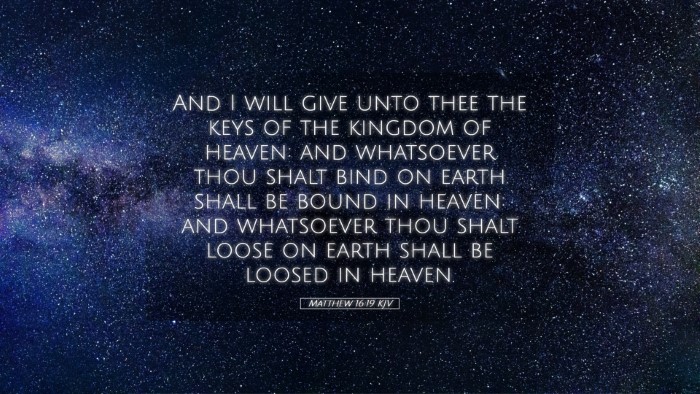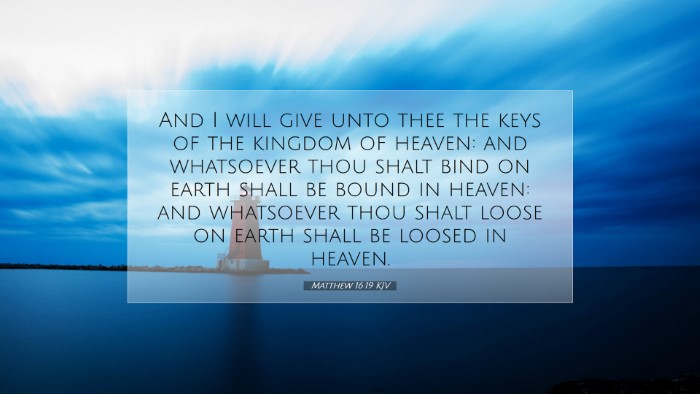Commentary on Matthew 16:19
Verse: "And I will give unto thee the keys of the kingdom of heaven: and whatsoever thou shalt bind on earth shall be bound in heaven: and whatsoever thou shalt loose on earth shall be loosed in heaven."
Introduction
Matthew 16:19 is a pivotal verse in Christian theology, particularly concerning the authority bestowed upon Peter and, by extension, the Church. This commentary synthesizes insights from notable public domain sources such as Matthew Henry, Albert Barnes, and Adam Clarke to provide a comprehensive understanding of this passage's implications for pastors, students, theologians, and Bible scholars.
Contextual Background
This passage occurs in the broader narrative where Jesus queries His disciples about His identity. Peter's declaration of Jesus as the Messiah sparks this moment, leading to Jesus’ profound response. The "keys of the kingdom of heaven" symbolize authority, governance, and access to divine truth.
The Significance of "Keys"
- Matthew Henry: He highlights that the "keys" represent not only access but also the authority to make decisions that have eternal implications. It reflects a divinely granted power to lead and shepherd God's people.
- Albert Barnes: Barnes amplifies the idea that keys are a symbol of a power that allows entry and exclusion from the realm of God's grace. The implication is that the Church has a significant role in determining the destiny of souls.
- Adam Clarke: Clarke emphasizes the historical context of keys in Jewish tradition, where they were often associated with authority and judgment. The metaphor reinforces Peter's leadership and the foundation upon which the Church would be built.
Binding and Loosing
The terms "binding" and "loosing" are crucial in understanding authority in the context of church governance.
Theological Implications
- Matthew Henry: He interprets binding and loosing as referring to doctrinal authority and church discipline. The apostles were empowered to establish church doctrine and address moral conduct, revealing the seriousness of their role.
- Albert Barnes: Barnes notes that this authority extends beyond mere ritualistic practices; it reflects the moral and ethical decisions that influence the spiritual direction of believers.
- Adam Clarke: Clarke suggests that this power is imbued with divine backing, where earthly decisions regarding doctrine and discipline are recognized in heaven, confirming the importance of ecclesiastical decisions.
Applications for the Church
This verse holds profound implications for pastoral practice and church leadership. Understanding the authority granted to the Church calls for responsible stewardship of this power.
Pastoral Leadership
- Moral Responsibility: Pastors must diligently seek God's guidance when binding or loosing within their ministry, ensuring that decisions align with Scripture.
- Discipleship and Governance: This authority is not to be abused but administered with love and humility, reflecting Christ's character in leadership.
- Community Impact: The decisions made within the church context will influence not just individual lives but the broader community, underscoring the necessity for wisdom.
Conclusion
Matthew 16:19 encapsulates a moment of transition in the plan God has for His Church. The keys symbolize the immense responsibility entrusted to Peter and, by extension, the Church as the body of Christ. This passage serves as a reminder for pastors, theologians, and scholars alike of the authority they carry and the ethical implications embedded in their ministries. As stewards of divine truth, they are called to a higher standard of integrity and discernment.


